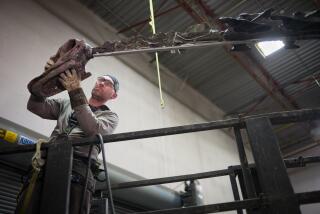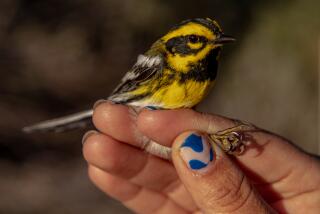Critics Hiss Over Asteroid Named After Finder’s Cat : Astronomy: A shortage of relevant monikers leads many cosmos watchers to improvise. But some say this goes too far.
- Share via
A cat. A Vulcan. And an asteroid. Mix them together and you have a controversy of cosmic proportions brewing around James Gibson, a planetary scientist from Tujunga who has become the target of scientific ire for naming an asteroid after his late cat, Mr. Spock.
“We knew that there would probably be some flak for it, but we didn’t expect it to go this far,” said Gibson, 66, who chose the name in 1985 with the help of his wife. He could have done far worse, he argued. “I let the whole universe of tasteless names go unaddressed.”
With more than 300 asteroids named every year, scientists are running out of names, and turning to those of political dissidents, musicians and even mistresses. That has irritated some members of the international astronomy group that registers such names, setting off a debate in the letters columns of astronomy journals.
Hitler can’t get one named after him until 2045 (there is a century-long moratorium from the time of death on naming asteroids after military or political figures), but otherwise the rules are limited: an asteroid that could eradicate all life on Earth--something the size of the Comet Shoemaker-Levy 9, which has been pounding Jupiter all week--could be named Dudu (Asteroid 564). Or it could even be named after a peace-loving Beatle (Asteroids 4147 to 4150 are named for John, Paul, George and Ringo).
But Gibson’s naming of Asteroid 2309 after his marble gray tabby, who kept him company at an isolated mountaintop observatory in Argentina, was apparently the last straw. In 1985, a review panel at the International Astronomical Union passed a resolution discouraging such pet names.
And, following the written debates in the journals, some scientists expect the issue may come hurtling back into view at the IAU meeting next month in Holland.
The rules that now regulate such names are “not entirely satisfactory,” concedes Brian Marsden, who serves on the IAU’s Minor Planet Names Committee. “It can get silly. But you have to have a sense of humor in this business.” Marsden, putting that philosophy into practice, supported the application to name 2309 for Spock the cat.
Tom Gehrels, a planetary scientist at the University of Arizona who coordinates the Spacewatch search for asteroids that may collide with the earth, is anti-Spock, saying the choice “has hurt (astronomy) enough that the committee will not allow it to happen again.”
Scientists believe most asteroids are rocky space chunks ranging from the size of a house to the city of San Fernando--cosmic debris left over from the solar system’s formation 4.5 billion years ago.
Asteroids are first given numbers upon their discovery. After their orbits have been confirmed in subsequent sightings by other astronomers, the discoverer has 10 years to assign a name, Marsden said.
As of today, 6,057 asteroids have been discovered hurtling through the solar system and about 4,600 of them have been named, said Marsden, who also serves as director of the Minor Planet Center in Cambridge, Mass. The names are registered by being published in the Minor Planets Circulars edited at the center.
Marsden said obvious names like Copernicus, Galileo and other famous astronomers have already been taken. “It does make things rather difficult when it comes to naming things,” Marsden said.
Gibson, however, is happy with the debate.
Gibson--an astronomer for 36 years who previously named asteroids after his wife, Ursula, and his hometown of Ellensburg, Wash.--submitted the name in part to reaffirm that asteroids should be named after those who have made helpful, significant or unusual contributions to astronomy. His late cat qualifies, he said, but some other personal choices do not.
“I don’t have a problem with people who name objects after the seven astronauts who went down in Challenger,” Gibson said. “But to name an asteroid for a granddaughter who isn’t out of the crib yet, that’s a little extreme.”
Mr. Spock--so named in part because his pointy ears resembled those of the “Star Trek” TV series Vulcan--deserves to be immortalized in the heavens for his services to astronomy by keeping Gibson company on his lonely work of watching the sky, Gibson figures. The tabby was often Gibson’s only companion on moonlit walks to the lonely observatory he worked at from 1971 to 1974 in Argentina.
It was in that observatory that he discovered Asteroid 2309 in 1971, which he would name after Mr. Spock in 1985.
“He was a great cat,” said Gibson, recalling the nights when the friendly feline would spend hours outside the observatory dome waiting for him, or entertain the couple in their home. “He had done more for us than some people (that) asteroids are being named after now.”
Mr. Spock died in 1985, shortly after the space rock was named for him. And Gibson has gone on to become a research assistant at the Jet Propulsion Laboratory in Pasadena.
Meanwhile, scientists hope that the controversy over what to name asteroids is settled soon.
At next month’s IAU General Assembly of 3,000 astronomers, Marsden said he expects to pitch a simpler idea: allowing a computer to invent names by randomly grouping several melodic vowels and consonants.
“The name won’t make any sense to anybody,” Marsden said. “But at least it will sound good.”






